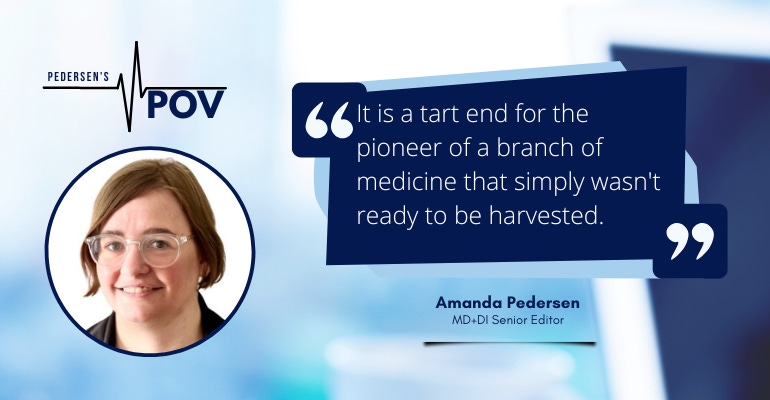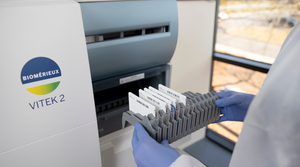Pear Therapeutics Ripened Before Its Time
The creator of digital medicine had a fruitful idea, but Pear fell from the tree before the market was ready to harvest such a forward-thinking technology.
April 17, 2023

Bankruptcy was certainly not the outcome Pear Therapeutics CEO Corey McCann envisioned when he founded the digital medicine company in 2013. Until recently, it wasn't the outcome many analysts and investors envisioned either.
Pear was a trailblazer in digital medicine – perhaps better known as prescription digital therapeutics (PDTs). Pear brought three products to market with FDA’s blessing, and scored an important reimbursement milestone for PDTs early last year. Pear’s PDTs were designed to treat substance use disorder, opioid use disorder, and chronic insomnia.
In January 2022, BTIG’s Marie Thibault (also an MD+DI alum) noted several clear advantages to PDTs, including few significant side effects, reduced barriers to treatment, access at any time via consumer technology, increased insight for clinicians, and lower costs.
“The PDT field is still maturing, and risks include unknowns like the rate of commercial adoption, increasing payor coverage, and long-term clinical and health economic findings,” Thibault wrote. “Still, we believe the appeal and promise of the PDT industry is too important to dismiss and we believe Pear is one of the best-positioned companies in the space.”
In October 2022, Thibault noted that Pear’s three commercialized PDTs had a total addressable market of more than $11 billion. At that time, she wrote, Pear had made meaningful progress with “an upward trend in prescriptions, an expanding prescriber base, broader payor coverage, and additional clinical and health economic data.”
Pear’s platform for developing and scaling a pipeline of PDTs had placed the company in a position to benefit from growing patient and physician awareness and access, the BTIG analyst wrote after hosting a call with two experts, Carolyn Warner-Greer, MD, medical director and addiction medicine psychiatrist and neurologist at The Otis R Bowen Center for Human Services; and Scott Whittle, MD, a consultant with JJ Strategies and former medical director of behavioral health at SelectHealth. Thibault noted that the Bowen Center is a high-volume site serving several hundred patients with outpatient services, an inpatient hospital, and primary care facilities. Warner-Greer has prescribed Pear’s reSET-O to hundreds of patients and regularly writes refills as well, while Whittle was a key advocate behind the August 2022 decision to add reSET-O as a covered benefit for SelectHealth's more than one million members.
“Both experts praised the quality of [Pear’s] clinical data and described reSET-O as a clinical intervention tool that patients can use on their own time and to supplement other treatment approaches,” Thibault wrote in a report following the call. “However, because many payors and providers are risk-averse and a new therapy category can change a payor's risk profile, the novelty of PDTs has delayed broader coverage for the therapy.”
From Whittle's perspective, the analyst noted, Pear’s clinical data was compelling enough to warrant coverage.
“He emphasized that while some organizations, including his own, may initially push back and say they need more information, this is usually about needing more time to find the right approach to integrate PDTs into an overall digital strategy,” Thibault wrote.
Warner-Greer added that introducing PDTs resulted in higher treatment retention. Thibault found that to be a greater indicator of value than abstinence, because opioid use disorder is a chronic, relapsing illness.
The biggest challenge Warner-Greer found to prescribing PDTs was overcoming privacy and security hurdles.
“To Dr. Warner-Greer's surprise, her patient's desire to use the PDTs extended beyond the value of contingency management (the potential for monetary gain) to include the ability to engage with the treatment on their own time and at the most-needed moments," she wrote.
It’s clear to me that the creator of digital medicine had a fruitful idea, but Pear fell from the tree before the market was ready for such forward-thinking technology.
Pear announced its first round of layoffs in July 2022, followed by more layoffs in November. In March, Pear disclosed it was seeking strategic alternatives, a sure sign of trouble. Less than a month later, Pear filed for bankruptcy. The company also pruned its workforce down to the core, which included the CEO.
In a bittersweet LinkedIn post that day, McCann noted the significant accomplishments of the Pear team in bringing the first PDTs to market.
"We’ve shown that clinicians will readily prescribe PDTs. We’ve shown that patients will engage with the products. We’ve shown that our products can improve clinical outcomes. We’ve shown that our products can save payors money. Most importantly, we’ve shown that our products can truly help patients and their clinicians," McCann wrote. "But that isn’t enough. Payors have the ability to deny payment for therapies that are clinically necessary, effective, and cost-saving. In addition, market conditions over the last two years have challenged many growth-stage companies, including us."
It is a tart end for the pioneer of a branch of medicine that simply wasn't ready to be harvested. But one day, prescription digital therapeutics will bear fruit, and Pear will be remembered for sowing the seeds for others to reap.
About the Author(s)
You May Also Like



